
Gravitational lensing - in 3D, made from mirror symmetry
04.02.2025 03:20 — 👍 0 🔁 0 💬 0 📌 0@lyraglass.bsky.social
Experimental VR and stereoscopic illusionist Trying to change how humanity perceives itself

Gravitational lensing - in 3D, made from mirror symmetry
04.02.2025 03:20 — 👍 0 🔁 0 💬 0 📌 0
J'aime les tartes bananiennes
バナナカステラが好き
#ステレオ写真 #立体写真
#stereophoto #3Dphoto #stereoscopic
Blue sky, ever seen the sky from above... in cross-eye 3D?
This is footage of Earth, taken on November 19th 2024, from the International Space Station



To those who are new to my work, I first started out creating 3D stereographs using gravitational lensing.
One day in ‘21, I crossed my eyes at double lensed image in space, and was shocked at the results. Ever since I’ve spent my career trying to bring attention to this phenomena.
Before going to bed last night I fired off a tweet about Joe a Rogan and Mel Gibson being very weird about ivermectin and fenbendazole as cancer treatments, and also how I don’t like rational, smart people going over the top attacking those drugs when the problem is Joe Rogan and Mel Gibson.
12.01.2025 15:27 — 👍 6437 🔁 290 💬 166 📌 30Just uploaded! :)
I have to streamline a process for making my videos smaller, BlueSky doesn't like the huge file sizes!
A stereoscopic 3D view of the moon Phobos eclipsing planet Mars, as seen by the Mars Rover Perseverance
Use your eyes to merge the images into one, and see the moon pop out! Top row is for cross-eye, bottom is for parallel eye.
How prepared for anxiety should I be? Sounds at least an 8/10
10.01.2025 02:47 — 👍 1 🔁 0 💬 1 📌 0
The famous pale blue dot image
may our pale blue dot be protected 💔
09.01.2025 20:00 — 👍 289 🔁 20 💬 8 📌 1this is a page of gofundmes and venmos for families affected by the devastating eaton fire.
please share or donate if you can ❤️🩹

The world has always been ending, in one way or another. What’s different now is how we metabolize that knowledge, how we carry it with us through our days.
10.01.2025 00:09 — 👍 8 🔁 3 💬 1 📌 1You’re too kind 🥹 I should have something new up by this weekend!
10.01.2025 02:22 — 👍 1 🔁 0 💬 0 📌 0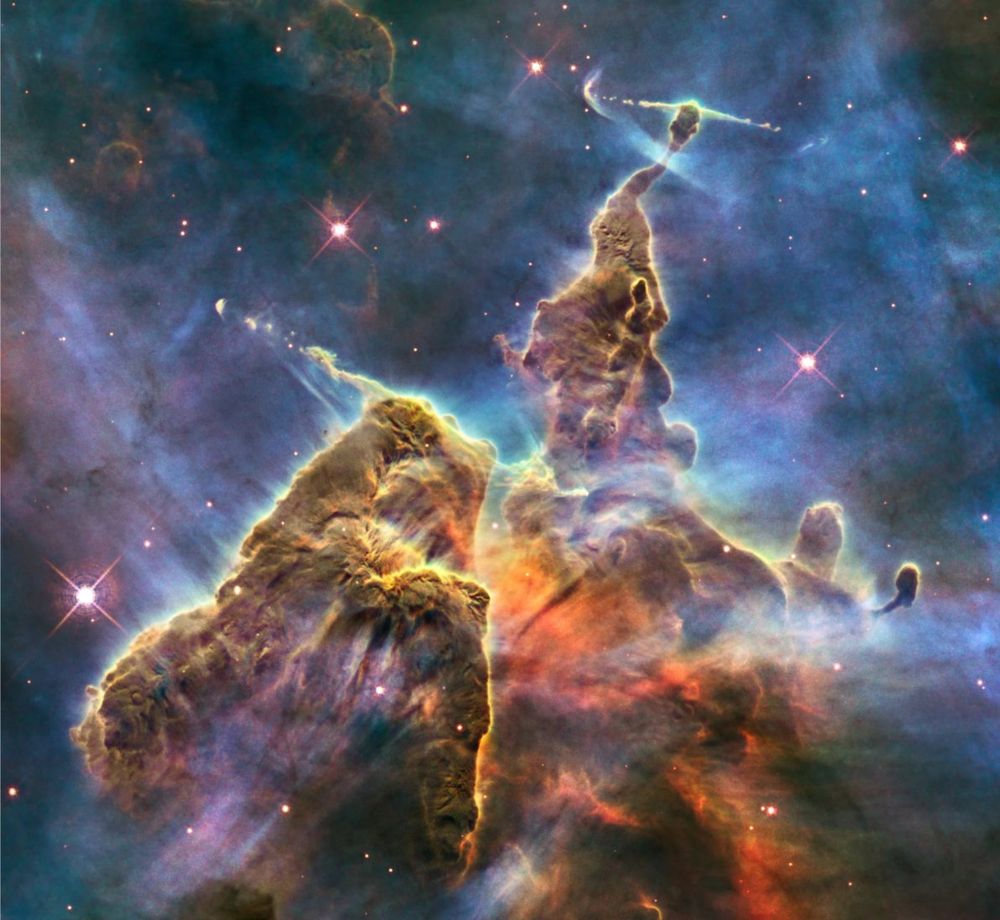
Large orange, yellow, and red clouds of dust and gas tower in the image, interspersed with a few pink stars.
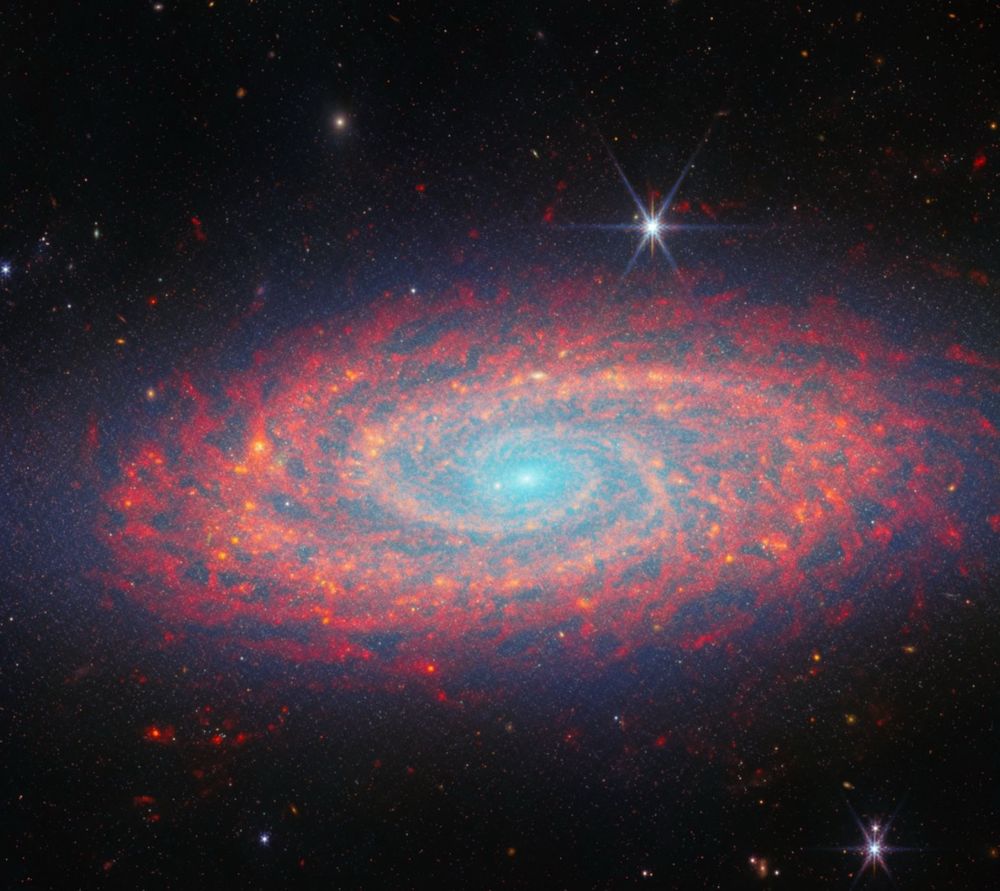
A spiral galaxy with a wide, oval-shaped disk. It has a shining spot at the center from which two curving, pale red spiral arms emerge, wrapping once each around the galaxy. They’re surrounded by a whirl of bright threads and patches of dust, with spots of star formation scattered throughout. The glow of the disk fades smoothly into the background where some patches of dust can be seen, as well as foreground stars.
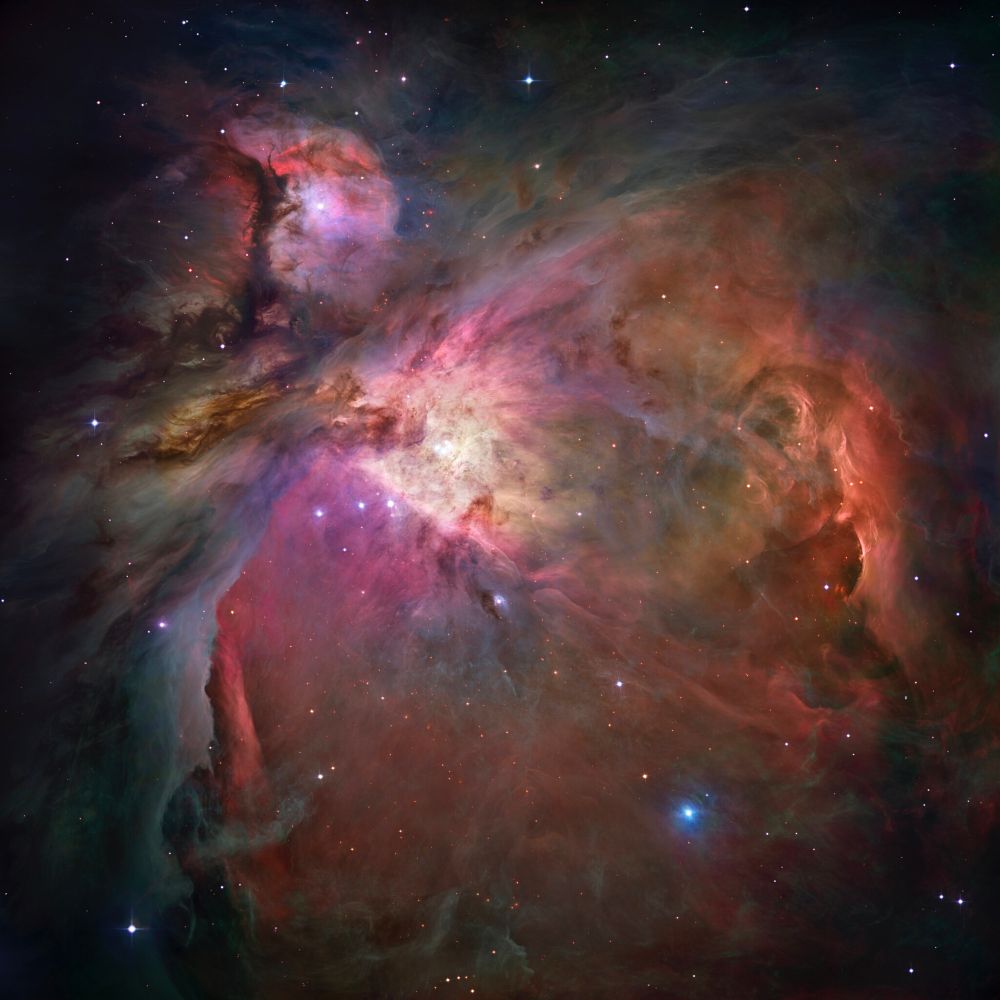
The Orion Nebula is an expansive and cloudy cosmic landscape. Sweeping clouds that shine in pink, yellow, orange, and other colors are bright against the black backdrop of space. Big stars are forming and glowing within the nebula.
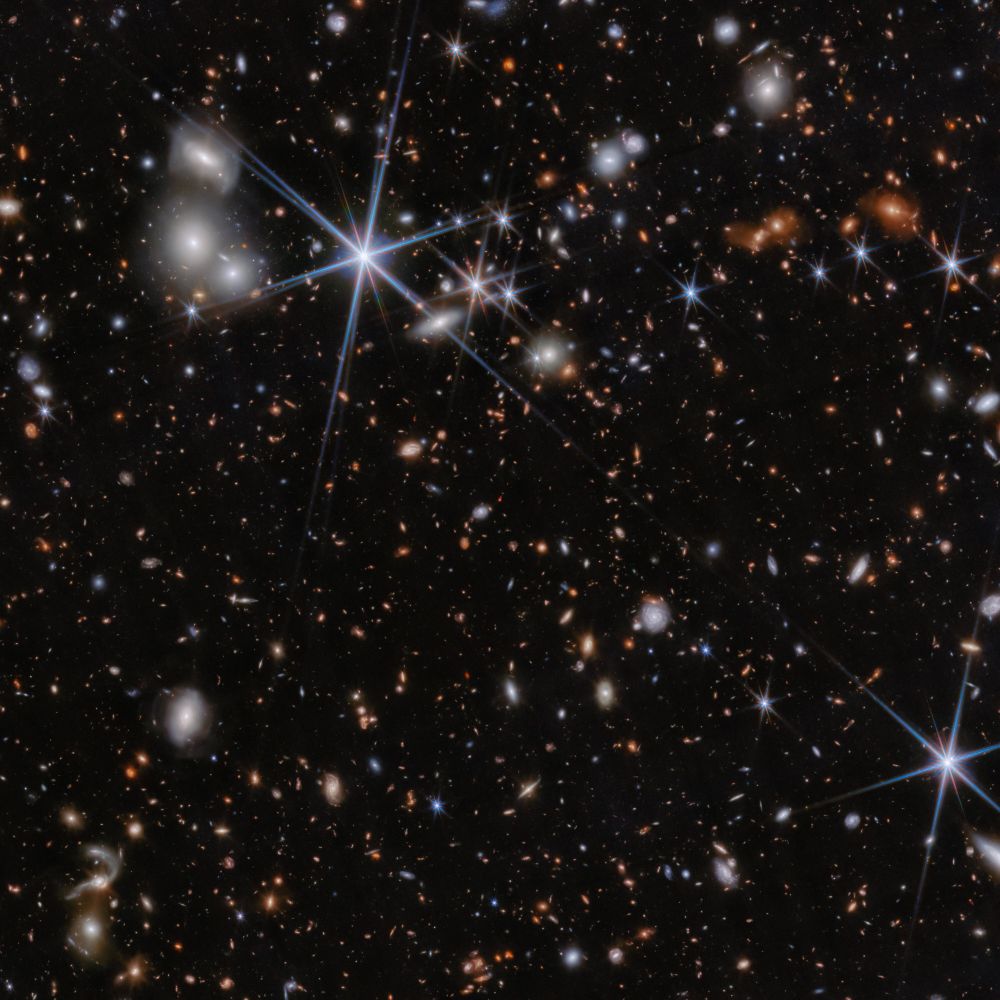
Hundreds of stars and galaxies in varying shapes, sizes and colors on a black background. Two of the largest, most prominent stars can be found in the top left quadrant and near the bottom right edge, respectively. They are tinged with blue and have an eight-point diffraction spike pattern. Near the center of this image is the ZS7 system, made up of a merger between two galaxies and their black holes. The ZS7 system is not easily seen by the naked eye in this image, as it looks like very small red dots.
lots of devastation and negativity on the feed today.
i know this won’t solve anything, but maybe it’ll make someone smile and just forget for a small moment.
the beauty of the cosmos 🌌
Bluesky! I'm Lyra Glass - I take footage of the cosmos and make them 3D using real parallax, but I also love to experiment! 🧪👀
This is Jupiter with moons Io and Europa, in stereoscopic 3D, that one can see using magic-eye techniques! More to come soon 🌍
(cross eye/top row, parallel eye/bottom row)

The wavelength bounds are widened beyond the visible range to extend just into the ultraviolet and infrared regimes: F343N is blue, F467M is green, FQ889N is red. Humans can't perceive these extended wavelengths. The result is a vivid disk that shows UV-absorbing lofty hazes as orange (over the poles and in three large storms, including the Great Red Spot), and freshly-formed ice as white (compact storm plumes just north of the equator). These filters (and others not shown here) allow astronomers to study differences in cloud thickness, altitude, and chemical makeup.
JUPITER LOOKS SO PRETTY IN UV AND NEAR-IR LIGHT!!!
06.01.2025 22:57 — 👍 539 🔁 67 💬 10 📌 4
A field of galaxies on the black background of space. In the middle, stretching from left to right, is a collection of dozens of yellowish spiral and elliptical galaxies that form a foreground galaxy cluster. Among them are distorted linear features created when the light of a background galaxy is bent and magnified through gravitational lensing. At centre left, a particularly prominent example stretches vertically about three times the length of a nearby galaxy. It is outlined by a white box, and a lightly shaded wedge leads to an enlarged view at the bottom right. The linear feature is reddish and curves gently. It is studded with about a half dozen bright clumps. One such spot near the middle of the feature is labelled “Mothra"
Galaxy cluster MACS0416.
Home to "Mothra", an extremely distant star that is magnified by a factor of at least 4,000 times due to gravitational lensing.
🔭 🧪
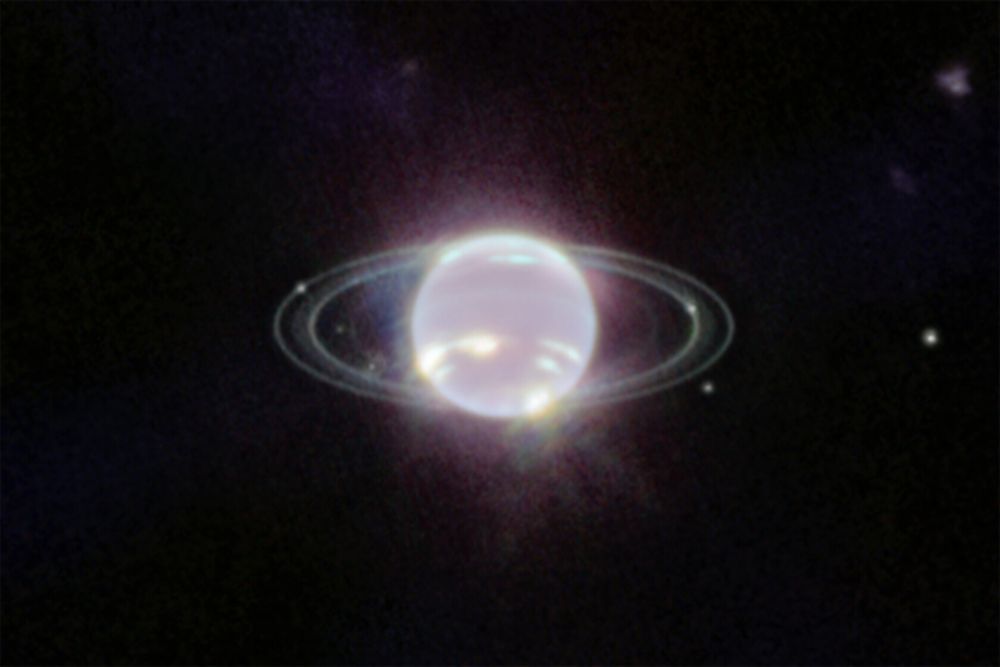
Webb’s Near-Infrared Camera (NIRCam) image of Neptune, taken on 12 July 2022, brings the planet’s rings into full focus for the first time in more than three decades. The most prominent features of Neptune’s atmosphere in this image are a series of bright patches in the planet’s southern hemisphere that represent high-altitude methane-ice clouds. More subtly, a thin line of brightness circling the planet’s equator could be a visual signature of global atmospheric circulation that powers Neptune’s winds and storms. Additionally, for the first time, Webb has teased out a continuous band of high-latitude clouds surrounding a previously-known vortex at Neptune’s southern pole.
Neptune by JWST.
🔭 🧪

Hey scientists of BlueSky, I hear you’ve got packs!
Can anybody recommend some good ones? I love illusions, experiments, stereoscopy—but any cool science or science communicator is my jam
I’m Lyra Glass—An autodidactic experimental 3D & VR artist! I make space look like it’s right in front of you.
My rendition of this Einstein Cross in experimental magic-eye 3D, made by mirroring the image with itself
#space #Einstein #experiment

Experimental 3D stereogram of a galaxy NGC 4579
So fascinating how the middle blue part is flat while the purple edges POP
A simulation of two black holes orbiting each other, and the resulting complex gravitational lensing
Made for magic eye 3D, to see extra detail
I will upload my 3D version someday soon :)
24.11.2024 06:27 — 👍 1 🔁 0 💬 0 📌 0Have you ever seen the Earth or Aurora Borealis in 3D, as if it were right in front of you?
Now you can. Footage of Earth taken from the ISS. For cross-eye viewing.
360° 3D stereogram of the Cat’s Eye Nebula, made from rotational symmetry
13.11.2024 18:48 — 👍 3 🔁 0 💬 0 📌 0